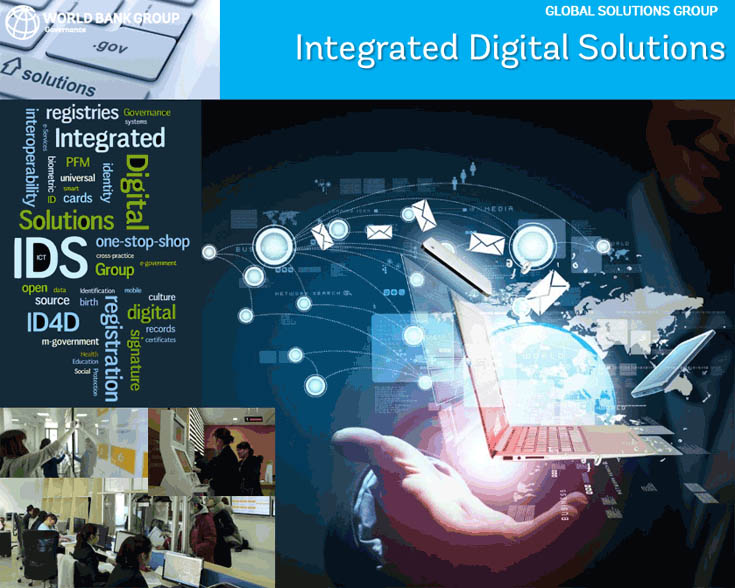OVERVIEW
The Integrated Digital Solutions (IDS) group is focused on addressing complex and transformative development challenges through integrated solutions that incorporate technology and innovation, cross-practice delivery of solutions, and global sharing of knowledge and good practices.
OBJECTIVES
The IDS domain covers the digital governance platforms integrating core Public Financial Management and other Sector Applications for improving public resource mobilization and management, integrity, openness, and public service delivery (for sound governance and effective institutions).
The transition from fragmented and/or outdated government systems to modern integrated digital solutions offers great opportunities to improve productivity, efficiency, effectiveness, responsiveness, and trust in government, in order to fight extreme poverty and boost shared prosperity around the world.
One of the key challenges is to integrate digital governance strategies into public sector modernization efforts to create a data-driven, digital culture in the public sector. Also, the coordination of ongoing parallel reform activities is crucial to maximize the benefits of large scale ICT investments and encourage the use of shared platforms and interoperability standards for cost-effective delivery and sustainability of government systems and e-Services.
To support the application of forward-looking IDS solutions that improve public service delivery, one key factor is the secure and efficient digital exchanges that take place between government entities (G2G); government and citizens, or users, (G2C); or government and the private sector (G2B).
Recognizing the potential of IDS and that about a third of the world’s population cannot participate in digital exchanges, the WBG launched the Identification for Development (ID4D) agenda in 2014.
ID4D’s goals and principles align not only with the World Bank Group’s twin goals of ending extreme poverty and promoting shared prosperity, but also with a recently proposed Sustainable Development Goal (SDG) 16.9 of “providing legal identity for all, including birth registration, by 2030.”
In order to contribute to the operationalization of the ID4D agenda and the challenges of SDG 16.9, the IDS group will focus on identity management with integrity. Specifically the work will focus on knowledge creation through analytic work and operational support through country specific solutions. As a part of this agenda, the group will also work on raising awareness of the challenges in digital records management and archiving, and identifying new solutions for effective digital information management in ID4D domain.
APPROACH
IDS brings together specialists from across the World Bank Group (WBG) interested in working on the digital governance agenda in various sectors to help coordinate the WBG’s interventions, provide cross-practice operational support, share lessons learned, and disseminate good practices.
In order to support improved public service delivery the IDS Group will initially work on the following priority areas:
- Mainstreaming integrated digital solutions in public sector reform projects.
- Supporting ID4D working group activities across global practices by focusing on strengthening of the civil and identification (legal) registries in order for these to guarantee the validity of the documents (certificates or identity cards) they issue.
The IDS Group will also collaborate with other groups working on relevant challenges (e.g., citizen engagement, open government, and mainstreaming ICT in operations).
EXPECTED IMPACT
The IDS Group aims to:
- Raise awareness of task teams and client countries on the importance of IDS.
- Support ongoing activities to bring public services closer to citizens and businesses.
- Strengthen public sector institutions by identifying the most important challenges in client countries, and providing advisory/hands-on support on country specific solutions.
- Support open government and public accountability initiatives.
- Develop and maintain global data sets to monitor and share the trends in modernization of critical government systems and e-Services, as well as ID4D platforms.
- Improve cross-practice communication and coordination of knowledge management to promote flow of knowledge and expertise across the WBG.

